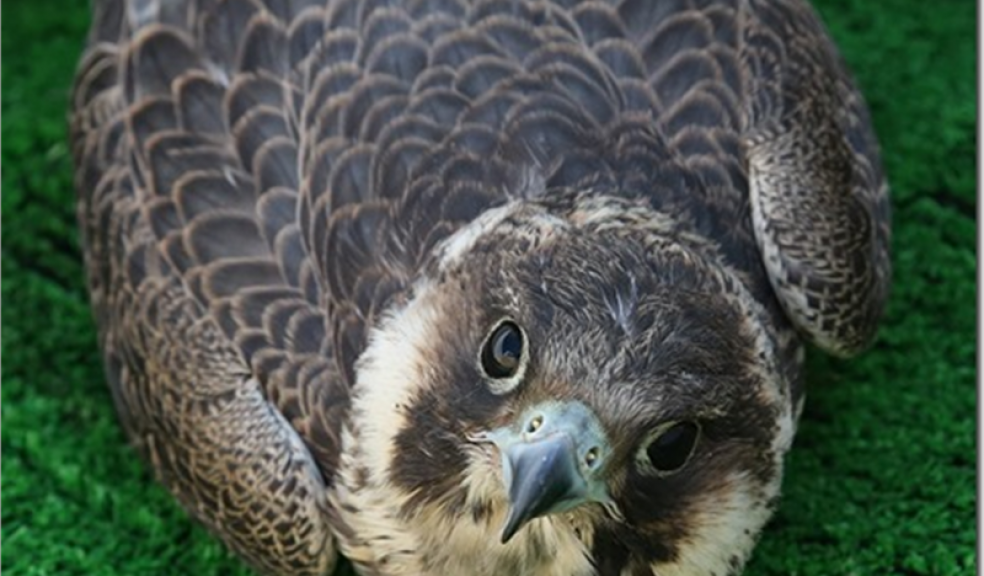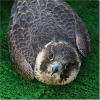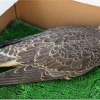
Peregrine falcon dies of suspected poisoning in Devon
Officers are investigating an incident after being contacted by staff at Glendinning Quarry in Ashburton, on Tuesday 15 August, following reports of an injured Peregrine falcon.
The falcon had been located on the floor of the quarry which is home to a breeding pair of Peregrine falcons.
Devon and Cornwall Police Wildlife Crime Officer, PC Josh Marshall, sought that the juvenile Peregrine falcon was given the immediate care it required. However, the bird died the next day.
PC Marshall said: “The initial inspection and condition of the bird strongly suggests that this bird had been poisoned. The bird has now been placed into the Wildlife Investigation scheme administered by Natural England where it will be forensically examined to establish the cause of death and a police investigation has now begun into the incident.
“Members of the public are warned that poisons commonly used to commit a crime like this are incredibly toxic to humans and pets. Should any person locate any dead or injured birds they are strongly advised not to touch them or let pets come into contact with them.
“Ingestion of these poisons can lead to death. It is incredibly concerning that individuals are using these types of chemicals within public areas that not only kill our wildlife but could also place members of the public, children and their animals into harm’s way.
“The area of Ashburton and neighbouring Buckfastleigh is unfortunately a hot spot for poisoning of these birds of prey. Previous incidents at the site are as follows;
2011 – 1 poisoned Peregrine falcon at White Cleaves (Buckfastleigh) Quarry – substance used - Aldicarb and Carbofuran.
2005 – Poisoned bait (racing pigeon) Glendinnings Quarry– substance used Aldicarb. A live bird with clipped wings. Adults missing presumed dead, chicks rescued. Police fitted telemetry device to see if pigeon would relocate but this failed. In Legal Eagle 47, page 5 - https://www.rspb.org.uk/Images/legaleagle47_tcm9-132970.pdf
2005 – 1 poisoned peregrine and 1 poisoned bait (pigeon) – substance used - Aldicarb, peregrine found on dead pigeon which had wings clipped.
2003 – Two men with a pigeon on a length of string appearing to try and lure peregrines from the top of White Cleaves (Buckfastleigh) Quarry. Police visited site but men had gone.
2000 – 1 poisoned Peregrine, substance used Aldicarb at Glendinnings quarry
2000 – 1 shot Sparrowhawk near Buckfastleigh (it lived).
1992 – 2 dead peregrines at White Cleaves (Buckfastleigh), with pigeon flesh in crop – tested positive for Malathion.
“As can been seen from this data, the use of illegal banned poisons are evident and put the public at significant risk. In the 2005 incident, a number of children could have been harmed or potentially worse when the poisoned bait (a racing pigeon) was located wondering around near to a childminders address.
“Significantly racing pigeons have been used as the bait for a number incidents both here and nationally and the answer to solving and preventing these poisonings could lie somewhere within a rogue minority of the racing pigeon community.
“Peregrine falcons do not differentiate between prey items such as wild pigeons and racing pigeons, this obviously causes conflict with some prize racing pigeons being taken by these birds of prey.
“Generally the method used will be to smear the bait with a vasaline type substance containing the poison onto either a live or dead bird. When the Peregrine plucks and eats the bait item the poison is then ingested and kills the bird. The bird dies then endures an excruciating few hours whilst waiting to die.
“South West Peregrines, a volunteer group who monitor these birds and others within the South West, have described the incident as ‘abhorrent’.
“We are urging members of the local community to come forward with any information they may have that can assist in bringing these offenders to justice."
Information is handled in the strictest of confidence and can be passed directly to PC Marshall at Joshua.marshall2@devonandcornwall.pnn.police.uk or by email 101@dc.police.uk or calling 101 quoting log number 0223 180817.
Information can be passed anonymously to Crimestoppers via 0800 555111 or the charity’s website at www.crimestoppers-uk.org
Tony Whitehead speaking for RSPB in the South West said: "Peregrines are magnificent and much-loved birds, whose comeback over the past twenty years is a conservation success. However, once again, it appears the peregrines at this site have been deliberately targeted and, it is suspected, poisoned.
“Should this prove to be the case, this is outrageous and the criminals must be brought to justice. We are also concerned that, should this again prove to be a poisoning, someone is wantonly placing toxic chemicals in the countryside which can be a danger to both humans and pets.
“Someone in the local community must have information about who's doing this and we urge people to come forward and contact the police. A £1,000 reward has been offered by the RSPB for information that directly leads to the prosecution of the offender.”





















